Streaming brought new ways to cheat at poker. Garrett Adelstein thinks he was a victim of one.
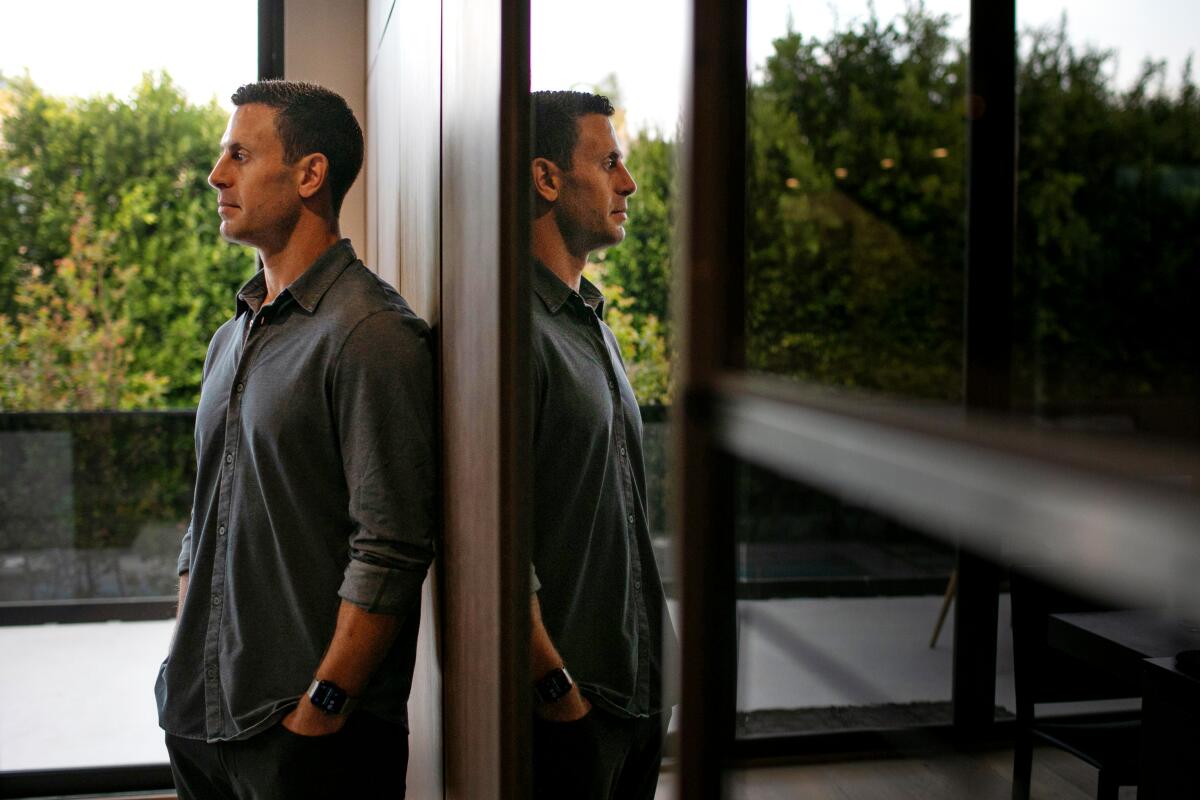
- Share via
Click here to read our previous interview with Robbi Jade Lew.
Garrett Adelstein was four months out of college, grinding his way through thousands of online poker hands a day while he figured out what he wanted to do with his life.
He was winning an average of $500 an hour and had calculated that he could make as much as half a million dollars over the next year if he kept at it. But Adelstein was conflicted, turning one afternoon to poker forum Two Plus Two to solicit advice.
“The main problem with poker for me is that day to day, I have mixed feelings about how happy I am doing this as a living,” he wrote in the 2008 post. “I just can’t see myself playing poker as a career for more than another 1-2 years at most.”
Fourteen years of playing professional poker later, Adelstein is one of the game’s best and most profitable high-stakes cash players, known to viewers of popular casino broadcasts for his loose-aggressive style of no-limit hold ’em and his willingness to buy in for enormous sums of money, bringing as much as $1 million to the table.
On Sept. 29, Adelstein made the biggest bet of his life: risking his well-respected reputation, and possibly his poker career, when he accused rookie player Robbi Jade Lew of cheating in a $269,000 hand against him on “Hustler Casino Live.”
Video of the hand — in which Lew’s unorthodox all-in call with the jack of clubs and the four of hearts led to an improbable win — was watched by 20,000 people as it was streamed and by hundreds of thousands more as the clip went viral. Some fellow pros have said Lew’s strategy in the hand was inexplicable unless she knew Adelstein’s cards; Lew later said she was confused about what she had but outplayed him nonetheless. The production company behind “Hustler Casino Live” said it is investigating and has yet to turn up proof of cheating by Lew or anyone else.
Without concrete evidence, the bombshell allegation has roiled the poker community, creating deep divisions across every level of the game as players and fans debate the hand and subsequent revelations. The fallout for both sides has been severe, with Adelstein and Lew each facing bitter character attacks and questions about their motives.
Robbi Jade Lew invited me to a jeweler in an effort to prove her ruby ring didn’t help her win the Texas Hold ’Em hand that has rocked the poker world.
Lew has maintained her innocence: “I 100% unequivocally did not cheat,” she told The Times, “and I’m just waiting for the investigation to show that.”
Adelstein, 36, hasn’t played poker since. Whereas he once spent much of his time studying optimal strategy, reviewing past hands and appearing on streams from Hustler Casino in Gardena and Bicycle Casino in Bell Gardens, he is now hyper-focused on conducting his own investigation to prove his case.
In a more than four-hour interview from his Manhattan Beach home on Tuesday, Adelstein said he was “extremely confident” that he was the target of a cheating ring involving not just Lew but other players and at least one member of the show’s production crew. Lew, 37, denied the allegation, which she called “defamatory.”
The drama has left Adelstein uncertain when he’ll return to the poker table. When I bring up his 2008 Two Plus Two post, in which a then-22-year-old Adelstein grappled with his ambivalence over a career playing cards, he says: “Despite not knowing much about anything at that time, I think I realized spending my professional life on a zero-sum game was going to have problems.”
Adelstein says he has been cheated before. When he was 26, he was invited to a home game where he bought in for $100,000.
High-stakes poker home games are notoriously rife with cheating and illicit activities, and Adelstein said he had a “really, really bad vibe” throughout the night. He believed the dealer was setting the deck in collusion with four players at the table, a suspicion that was heightened when his second-nut flush was beaten by the nut flush — the best possible five suited cards in a given hand. It’s a scenario that happens, “but quite rarely,” Adelstein said.
The only way that I could feel confident that the truth would come out is if I went and got it myself.
— Garrett Adelstein
Having lost all his money, Adelstein left. But the incident rattled him and he soon got in touch with the host of the game, who offered to meet at Q’s Billiard Room in West Los Angeles. There, Adelstein said, he laid out his suspicions about the intricacies of the operation to the host and a business partner, and said he would go public with what happened.
“They offered me a deal where they would refund me my money in exchange for my silence,” he said. “And then they paid me in six installments, once a month, for a six-month period.”
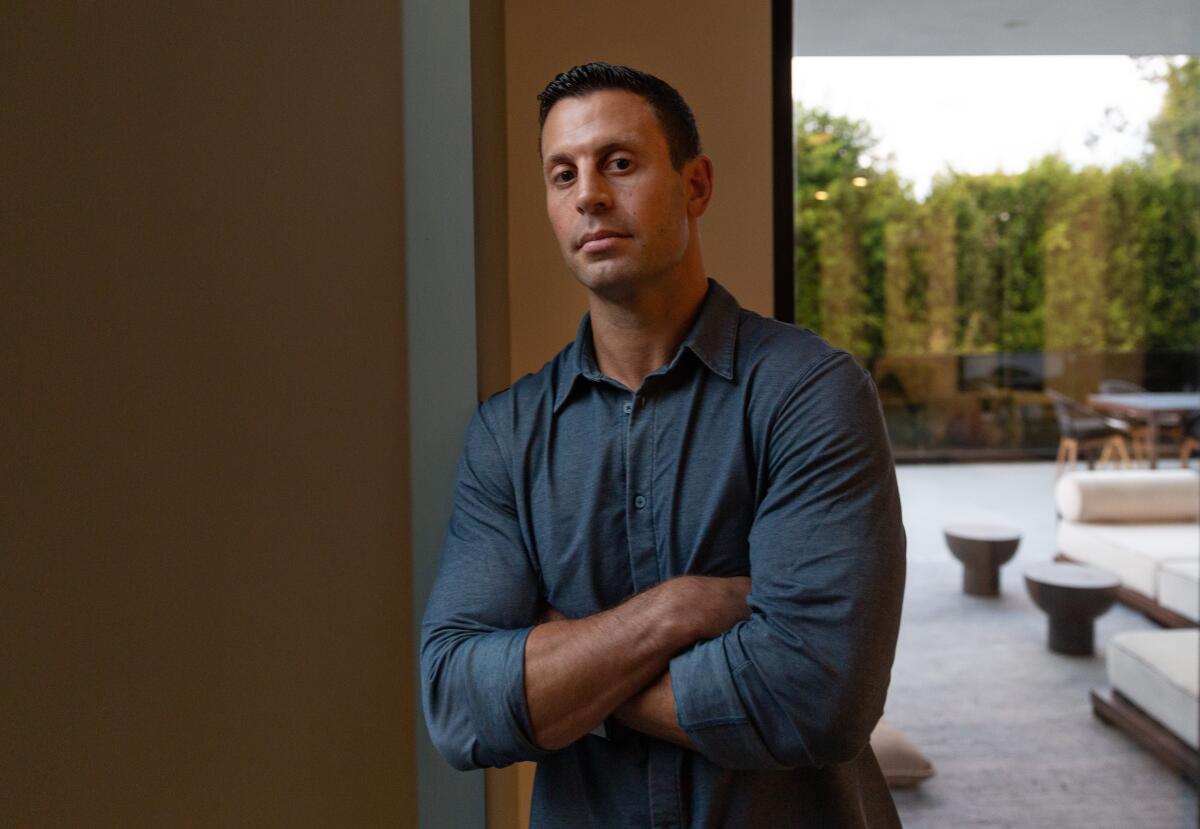
The incident, which he relayed on a poker podcast last year, showed Adelstein the darker side of poker and left him cautious.
He never played in a high-stakes home game with strangers again, choosing to exclusively play in casinos, where he reasoned cheating would be less likely. Still, “I’m always looking out for it,” he said. “I’m not the world’s most trusting guy when it comes to poker.”
Cheating has been a long-standing concern within the poker community.
There are the home-game horror stories and the well-documented problems with unregulated online poker rooms. About 15 years ago, major online poker websites were busted for running fixed games in which “superuser” accounts — often held by employees of the sites — had access to every player’s facedown cards, known as hole cards; knowing that information gave superusers an insurmountable advantage. Some players have shared their methods of in-person cheating, such as Houston Curtis, executive producer of rival poker stream “Live at the Bike,” who detailed how he rigged games in a 2020 book and on YouTube.
In casinos, measures such as automatic card shufflers, floor supervisors, security guards, cameras and frequent dealer rotations provide some level of security, but cheaters still get through. And new security risks have emerged as poker rooms introduce more modern features to enliven the game and grow its fan base.
“Whenever you’re talking about large sums of money and playing a game, there’s always going to be people who are trying to skirt the system, cheat, steal or look for any edge they can find,” poker pro Daniel Negreanu said. “Now with poker being streamed, there are new avenues in which people can cheat.”
As cryptocurrencies and NFTs gain popularity, addiction specialists are hearing from people whose compulsive trading resembles full-blown dependency.
In 2019, a civil lawsuit was filed against poker player Mike Postle, Stones Gambling Hall near Sacramento and a poker room manager. In it, dozens of poker players alleged that Postle, while playing on the casino’s streamed games, was fed information about opponents’ hole cards in real time by an accomplice. Games featured on the stream used playing cards embedded with radio frequency identification (RFID) tags that transmitted each card’s unique suit and rank to a receiver.
The suit was eventually dismissed, with a judge ruling that the damages were “quintessential gambling losses that are barred for recovery by California public policy.”
“If you cheat in any other game, you’re cheating the house and they’ll absolutely hammer you,” poker commentator Veronica Brill, one of the plaintiffs, said. “With poker, it’s incredible — no one goes to jail. Nothing really happens to anyone; it’s so frustrating.”
“When it comes to stream security and these types of games, as professionals we’re obviously always on the lookout so it doesn’t happen again,” poker player Matt Berkey said of the aftermath. “Garrett’s one of the biggest players who plays on stream, so he himself is more of a potential target.”
“Hustler Casino Live,” the streaming show that hosted the now-infamous Sept. 29 game, also uses RFID playing cards. Since its first show aired in August 2021, it has become the world’s most-watched poker stream, combining the drama of the game with huge amounts of cash, poker’s top players, celebrities and other colorful personalities. “Hustler Casino Live” now has more than 1 million monthly unique viewers and 185,000 subscribers.
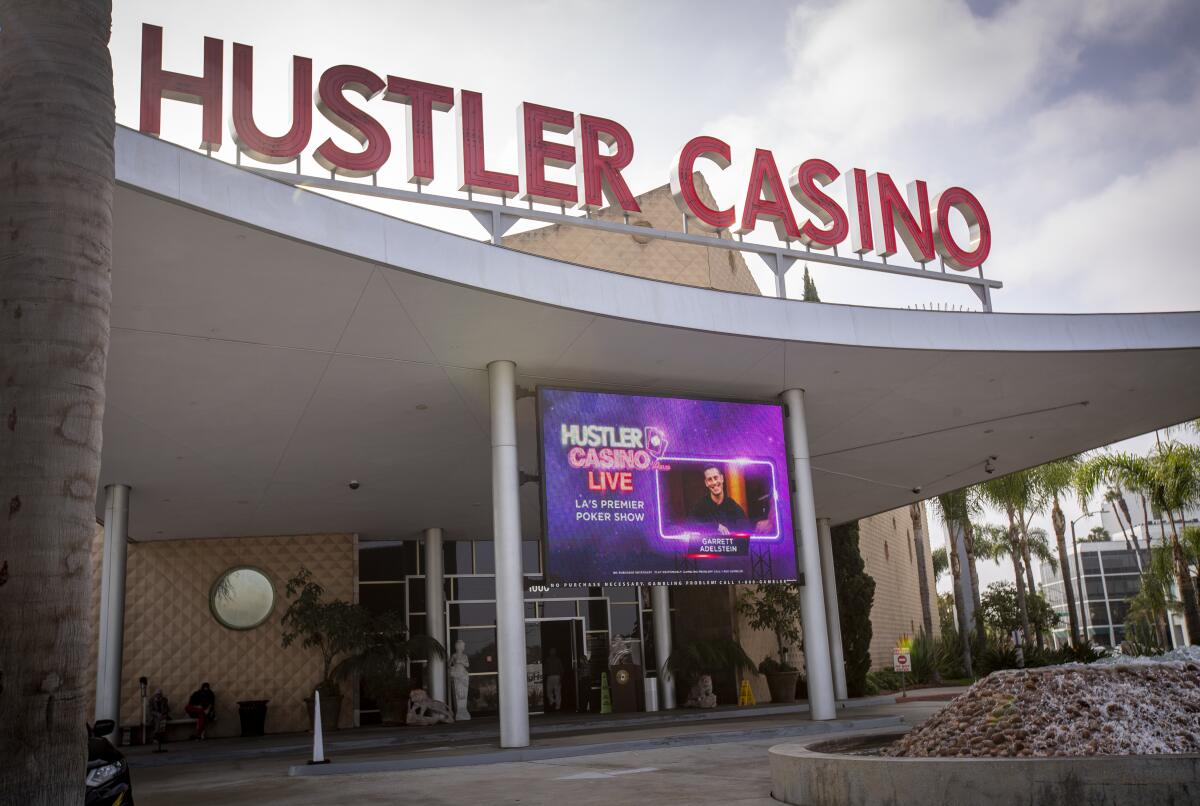
The show’s games are streamed five days a week on a delay of one to four hours to prevent information from being passed to players live. But now its stream security has been called into question, with players saying tighter protocols need to be implemented. They’ve raised concerns over the number of employees who had access to the control room where hole cards were being monitored, and a few have said the stream should temporarily shut down while the investigation is ongoing.
Adelstein was featured about once a week on “Hustler Casino Live” and is its most successful player, racking up more than $1.5 million in winnings over 53 appearances. Being a regular on the show, taped 15 minutes away from his home, provided a measure of stability that is rare among pro poker players, who often have to travel around the world to find fair games at high enough stakes.
“I thought that streamed poker was, at least by comparison to the other options, one of the last safe havens,” Adelstein said. “And at this point, I have so little faith in that.”
With its most prominent star refusing to play, the production company behind “Hustler Casino Live” quickly launched an investigation into the Sept. 29 incident, hiring a private investigator, a cybersecurity firm and a law firm. Nick Vertucci, co-owner of High Stakes Poker Productions, said in an interview Monday that the process is expected to take several more weeks to complete.
“I’m building the perimeter,” he said. “These things take time.”
He added that the company was reviewing its security protocols and would make changes to ensure its stream is “as secure as possible.”
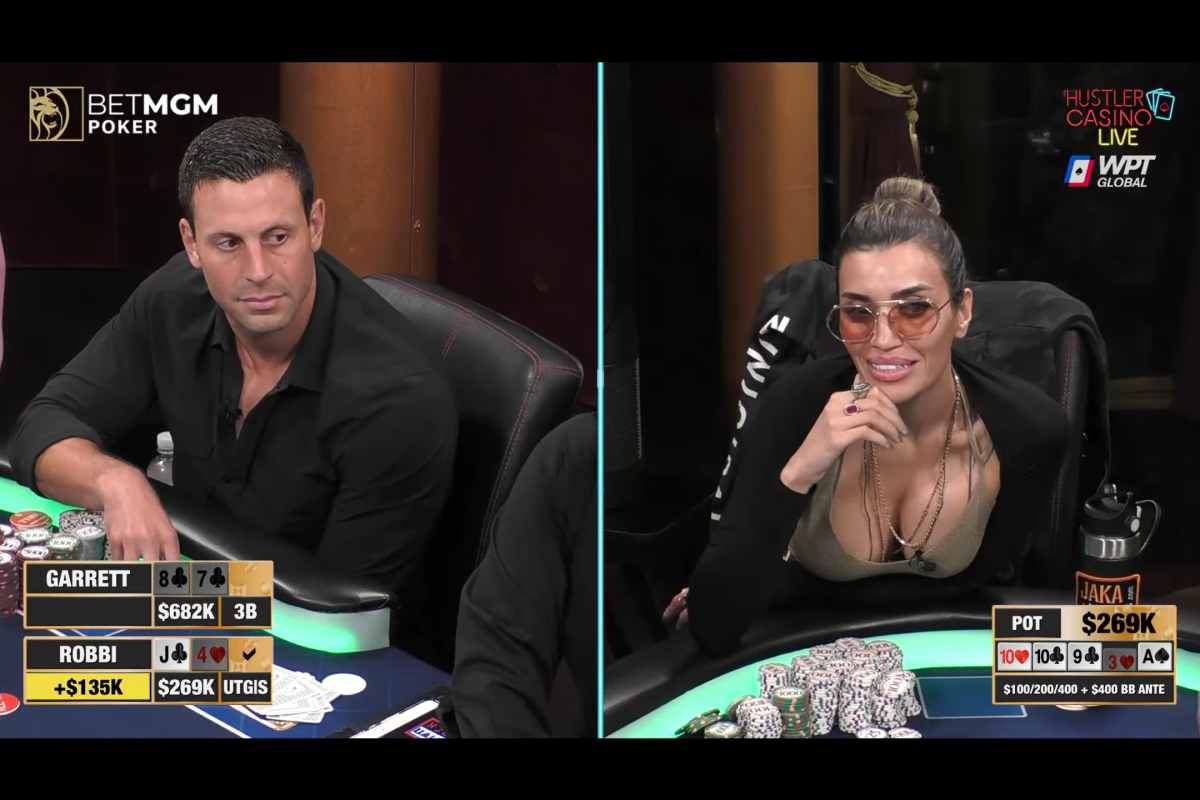
Scores of professional and recreational poker players have jumped in to conduct their own amateur sleuthing, touting their findings and opinions around the clock on Twitter, Reddit and YouTube.
“There are a lot of accusations, a lot of speculation, and a lot of innocent people will be hurt by the circus and the conspiracy theories,” Vertucci said. “This thing is being blown up for clicks, views and money. It’s disgusting what’s happening.”
High Stakes Poker Productions released the first of its findings Oct. 6, saying a review of its video footage showed that one of its employees, 24-year-old Bryan Sagbigsal, was caught taking $15,000 in chips from Lew’s stack after cameras stopped rolling Sept. 29. The company also said Lew declined to press charges after being informed about the incident.
That decision led many to suspect that Lew and Sagbigsal were working together, which she denied. Two days later, she announced on Twitter that she had changed her mind and would file charges. Reached outside his girlfriend’s home in Long Beach on Sunday afternoon, Sagbigsal declined to answer questions.
On Thursday afternoon, Lew and Vertucci met with a detective from the Gardena Police Department at Hustler Casino. She said she turned over direct messages that she received on Twitter from Sagbigsal after the Sept. 29 incident.

Meanwhile, Adelstein released his own 5,600-word report on Oct. 7. In it, he asserted “with great confidence” that Lew was “very likely part of a cheating ring of at least three members,” one of whom was able to access hole-card information and signal the cards to others during several hands of play across multiple broadcasts. Much of the report focused on circumstantial evidence, suspicious-seeming behavior and inconsistencies in Lew’s statements. Adelstein wrote that his legal team had advised him to leave out speculation about “the specific methodology and roles of each member of the cheating ring.”
“It was about six or seven days, 20 hours a day, of becoming this investigator,” Adelstein said, sitting on a curvy upholstered armchair in his spacious gray-toned living room. “That was my mindset: that the only way that I could feel confident that the truth would come out is if I went and got it myself.”
Responding to Adelstein’s report, Lew said on Twitter that it was “full of inaccuracies and conjecture” and used a poop emoji to characterize his presentation of evidence. Via text message, she added, “I will not respond to anything else because everything he has stated is defamatory.”
Adelstein was born and raised in Tucson, the eldest of three children in a middle-class family that lived in the middle-class part of town, in the shadow of the nicer Catalina Foothills community.
“We couldn’t afford to live there,” he said. “From a very young age, I pretty deeply believed that becoming very wealthy was the key way to find happiness in life. And I definitely had a rude awakening in my mid-20s in terms of, that is not true at all.”
He began playing poker in 2003, a monumental year for the game. That May, Chris Moneymaker won the World Series of Poker Main Event as an amateur player, kicking off a worldwide poker boom.
Adelstein moved to L.A. a couple of years after graduating from the University of Arizona, where he double-majored in entrepreneurship and marketing. While drinking with friends at Cabo Cantina in Marina del Rey one night, he was approached by two casting directors from “Survivor.” He joined the Season 28 cast in 2013 but was the second contestant voted off, an early exit that sent him into a deep depression.
During that period, Adelstein said he rarely left his one-bedroom West L.A. apartment, ordering delivery and packing on 50 pounds. Around his 30th birthday, he sought help from a psychologist and in the years since has used his platform as a well-known poker player to speak frankly about his lifelong bouts with depression.
“I’ve made great strides, whereas in the past, I could lay in bed for months,” he said. “Convincing my wife to marry me and, to a large extent, overcoming these mental health struggles I think are the two things I’m most proud of.”
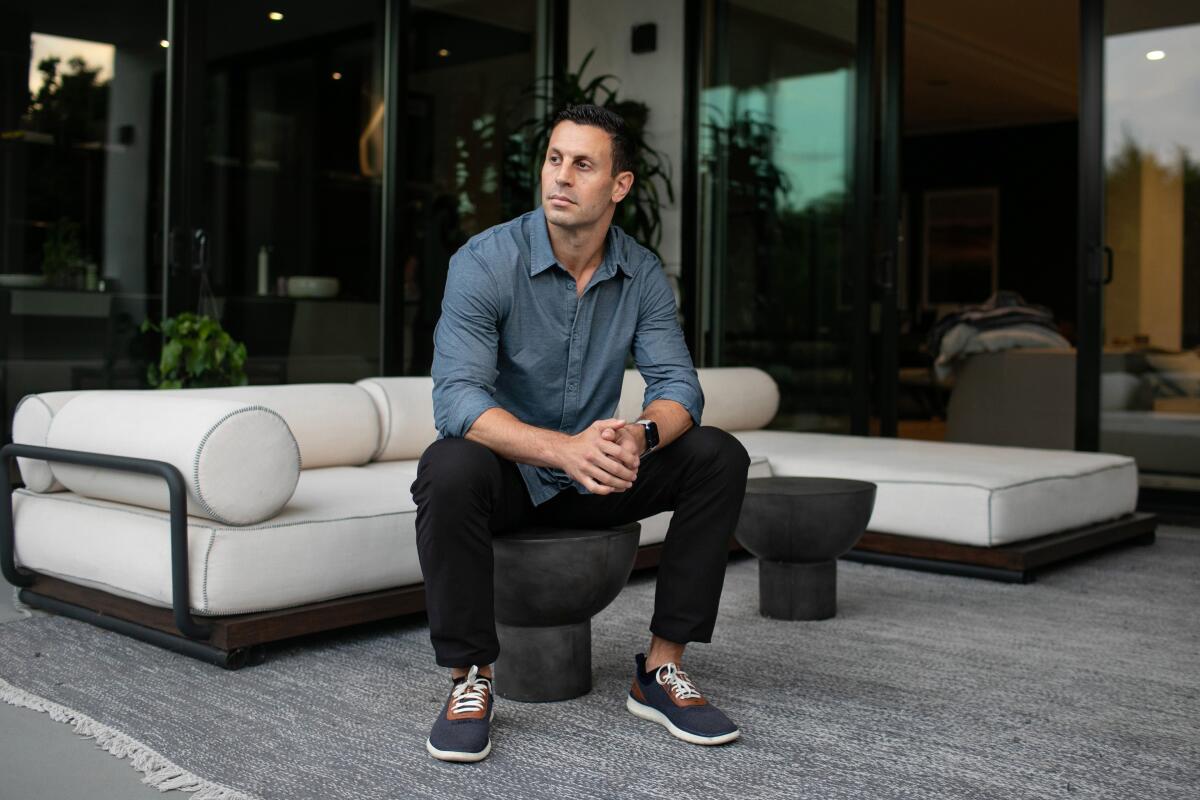
He is a voracious reader of self-help books and biographies, and a fitness fanatic who in July drove to Mt. Whitney in the middle of the night when he noticed a last-minute permit to hike the mountain had become available. He summited the 14,505-foot peak alone later that day.
Professional and recreational poker players on both sides of the current controversy described Adelstein as an affable guy who is known for taking even big losses in stride.
“Garrett would have reacted normally if his opponent made a good, even heroic, call that cost him $100,000,” said Jennifer Shahade, a pro poker player and chess champion. “I think the initial hand, the call and the situation would be suspicious under any circumstances, any gender.”
Negreanu said Adelstein has long been “a class act” in the poker world and an ambassador of the game.
“Having said that, he’s doubled down,” Negreanu said of the cheating allegations. “I think he could have handled this very differently and better than he did. But that’s not to suggest that it should besmirch him or muddy his name.”
Secretive members clubs became even more in demand during the pandemic with their promise of a full-lifestyle day-to-night experience that combines co-working and socializing under one stylish roof.
Adelstein has seen the raging debates play out online over the last two weeks, the 12-hour-long podcasts dissecting the day’s developments, memes of his shell-shocked face after Lew revealed her cards, the video parodies of the various characters involved.
If he could redo things, he said, he would tone down his initial statement on the night of the game. Other than that, “I wouldn’t change a thing,” he said. “And that, to me, almost indicates it was inevitable: My professional life was going to be forever altered.”
“Live at the Bike,” on which Adelstein has played several times, has been hitting him up since Sept. 29 in the hopes that he will join its stream. But he says he’s not in the right headspace for it.
“There’s I guess a world in the next several weeks or months where maybe I’m able to process this and want to play a poker game. But at the moment, that’s not how I feel,” he said.
“I’m not playing poker on a stream again unless I see tangible, noticeable, measurable differences in livestream security,” he continued. “That’s for my own benefit and it’s for the benefit of the poker community at large.”
More to Read
Inside the business of entertainment
The Wide Shot brings you news, analysis and insights on everything from streaming wars to production — and what it all means for the future.
You may occasionally receive promotional content from the Los Angeles Times.














